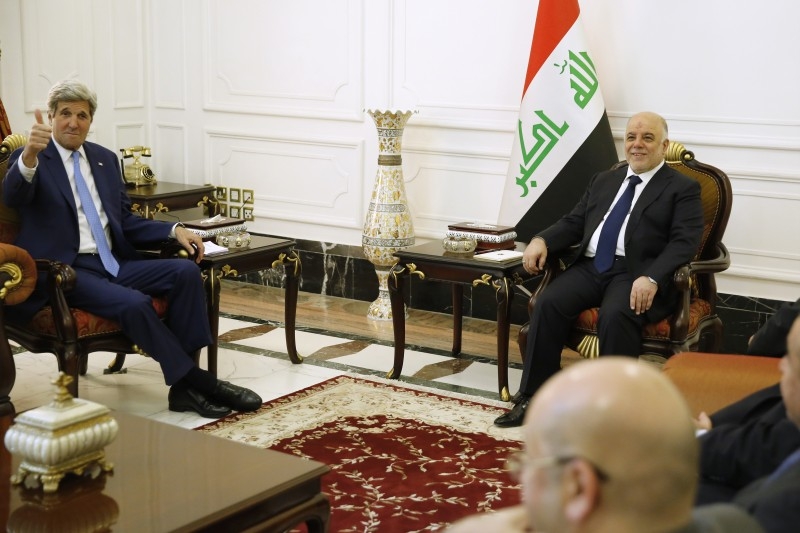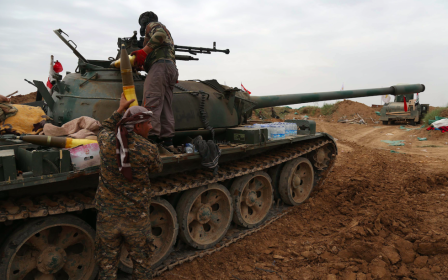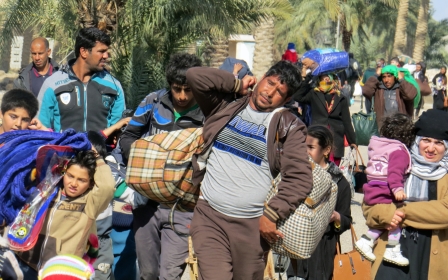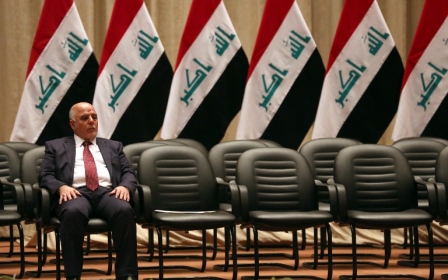Iraq PM delivers new cabinet list, angering some MPs

Iraq's prime minister delivered a new list of cabinet nominees to the parliament speaker on Tuesday, sparking rebuke from some lawmakers who said the list only perpetuated the system of ministries being distributed according to political quotas.
Parliament descended into chaos after the session, with some MPs shaking fists and chanting against political quotas and in support of the constitution, which other politicians have fought hard to keep.
According to video shot inside parliament, after the session ended some MPs chanted: "The people want the fall of the quotas!"
The phrase is a variation on "The people want the fall of the regime," which was chanted at Arab Spring protests against leaders across the region.
Prime Minister Haider al-Abadi had called for a government of technocrats to replace the current party-affiliated ministers, but has faced major resistance from powerful parties that rely on control of ministries for patronage and funds.
He presented a list of 13 cabinet nominees to parliament on 31 March, but MPs later said that the political blocs would nominate other candidates, a process that apparently resulted in the current list of names.
Abadi gave the new list of candidates to parliament speaker Salim al-Juburi and the two men subsequently held meetings with leaders of the political blocs, according to posts on their official Twitter accounts.
But with major disagreement over the proposed list, the session was postponed until Thursday, Juburi's office said, with him later stressing that the new list is opposed by almost a third of MPs.
According to the new list of 14 names, a copy of which was obtained by AFP, only four of Abadi's original nominees made the second cut.
The nominees for water resources, health and transport stayed the same, while a fourth nominee from the original list became a candidate for the planning ministry.
The new list also includes Faleh al-Fayad, a long-time member of the main Dawa party who served as national security adviser under former premier Nuri al-Maliki and then Abadi, as the nominee for foreign minister.
Abadi has been accused of undermining democracy and “leading a coup” against Iraq’s power-sharing political structure that has been in place since 2003, which guarantees a certain number of political positions to the country’s Shia, Sunni and Kurdish blocs.
But Abadi told Middle East Eye last week in a phone interview that rival political blocs had not responded to his request for them to nominate their preferred independent candidates for cabinet posts last month.
"I asked to form a government of technocrats,” Abadi told MEE.
"At the beginning of last month I formally asked the [political] blocs to nominate technocrats who they think are appropriate, but the blocs did not do so," he said.
“It was Sadr who demanded a government of independents, except for the prime minister," Abadi added in reference to Moqtada al-Sadr, the influential Shia cleric who has threatened to raid Baghdad’s fortified Green Zone unless his demands for political reform were met.
Abadi said he was committed to conducting government business in a professional manner, without interference from either his own or other political blocs.
But MP Zainab al-Tai, from the bloc affiliated with Sadr, threatened a no-confidence vote in Abadi.
"We demand the formation of an independent government, and if not, we will go to withdraw confidence from Abadi's government," Tai said.
Abadi called in February for "fundamental" change to the cabinet so that it includes "professional and technocratic figures and academics".
That kicked off the latest chapter in a months-long saga of Abadi proposing various reforms that parties and politicians with interests in the existing system have sought to delay or undermine.
Abadi first announced reform measures last year under pressure from protesters calling for measures to address widespread corruption and abysmal services, demands that were backed by top Shia cleric Grand Ayatollah Ali al-Sistani.
But the protest movement faltered, weekly attendance at Friday demonstrations dropped and little in the way of real, lasting change has been achieved.
New MEE newsletter: Jerusalem Dispatch
Sign up to get the latest insights and analysis on Israel-Palestine, alongside Turkey Unpacked and other MEE newsletters
Middle East Eye delivers independent and unrivalled coverage and analysis of the Middle East, North Africa and beyond. To learn more about republishing this content and the associated fees, please fill out this form. More about MEE can be found here.




